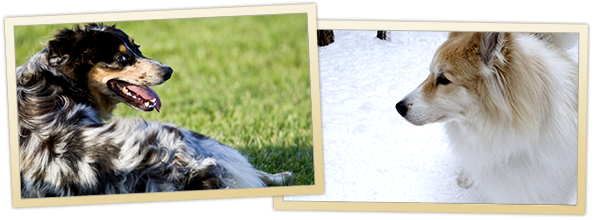Nature's Plan
Animal Planet

Which Breed of Dog is Right for You?
There are many things to consider when selecting your puppy, and you should choose a dog that is best suited to you and your lifestyle. Here are some rules of thumbs that can help with your selection.
Where to Start
There is no perfect breed or the perfect puppy. Any puppy can become a great companion if well-loved and appropriately trained. Try and seek advice from several sources and evaluate the advice carefully, and most importantly, apply your own common sense. Choosing a puppy to share your life is a very personal choice. Remember, you are selecting a companion to be by your side for a long time. Although, people seldom listen to advice and usually end up choosing with heart instead of with their head, you will save yourself a lot of heartache and unnecessary trouble if your selection is an informed and educated one.
Dog Breed
When evaluating different breeds, you need to understand potential breed-specific problems and know how to deal with them. Meet and play with the dogs and talk to their owners. Learn what to expect. Puppies have varying behavior and temperament, and there may be as much variation of behavior among individuals of the same litter as there is among dogs of different breeds. It is also crucial to remember that education, such as socialization and training, will have much impact in achieving domestic behavior and good temperament.
Breed is a very personal choice. Select the breed you like, investigate the specific qualities and problems, and decide the best way to raise and train your puppy. Regardless of your eventual choice, the puppy's behavior and temperament are entirely in your hands.
Mixed or Purebred
The biggest difference is that pure breeds are more predictable in looks and behavior, whereas mixed breed is simply unique and one-of-a-kind. Mixed breeds are generally healthier and tend to live longer with fewer health problems. However, at the end of the day, there is no “right” answer. The decision is a just your personal choice.
Herding Dog Breeds
Some of the more popular intelligent dog breeds belong to this group, including the German Shepherd, Border Collies, and Corgis. Herding dogs are extremely active and protective of their people and surroundings. Energetic, smart, and sometimes even serious, they require owners who are skilled at training and willing to give them "work" that rewards their instincts.
Hound Dog Breeds
The hounds are the original hunting dogs, with a wonderful sense of smell and athleticism. They range from the Irish Wolfhound, short-legged Dachshund, Afghans, Greyhounds, to Salukis. Some hounds need extensive exercise but some breeds can do with intense exercising before and after work. Most hounds make excellent pets. Reliable, sturdy and possessing excellent stamina, they make great companions for adults and children alike.
Non-Sporting Dog Breeds
This is the catchall group for breeds that didn’t seem to fit any other categories. Breeds range from the cuddly Bichon Frise and the Dalmatian to the Chow Chow, but the Poodle is by far the most popular of the non-sporting breeds. Their individual skills, original purposes and temperaments are almost as varied as their origins. They are sturdy animals but not specifically bred to track prey or to do specific tasks. If you look at any two non-sporting dogs, chances are you won't find much in common with them, so be sure to read about each breed before making your decision.
Sporting Dog Breeds
The sporting group comprises some of the most popular breeds, such as the Labrador Retriever and the Golden Retriever. They are alert, active, and intelligent and are still used as hunting companions today, although their gentle natures and high level of trainability also makes them one of the best family dogs.
Terrier Dog Breeds
Most Terriers were originally bred to dig up underground dens and burrows while barking furiously. They are energetic, tenacious, brave and determined dogs and have always been viewed as real assets by their owners. Terriers are small to medium size and often described as feisty. They can be friendly, stable and loyal pets. However, the smallest terriers are ready to take on any opponents, a necessary attribute when hunting but not so desired as a family pet. Some Terriers are known to nip children and can be difficult to train.
Toy Dog Breeds
Many toy breeds, such as the miniature Pinscher, the Toy Poodle and the English Toy Terrier appear to be miniaturized versions of larger breeds. They make excellent pets without needing a lot of extra space in their homes, and are considered the best dogs for novice owners. However, their fragility can make them less than ideal pets for families with small children. Loyal and intelligent, they are superb at learning tricks and very obedient.
Working Dog Breeds
This group includes most of guard dog breeds such as the Rottweiler and Doberman Pinscher, as well as sled dogs such as the Alaskan Malamute and the Siberian Husky. Most of these dogs need lots of exercise and a fair amount of living space, and many are heavy shedders. A diverse group, most working breeds are intelligent, powerful and headstrong, often unsuitable for novice owners. Made up of guardians of livestock and property, police dogs, sled dogs and rescue dogs, they come in all shapes and sizes, from the standard Schnauzer to the Great Dane. Working dogs make excellent pets as long as you understand that they must be given enough 'work' to do and exercise at appropriate levels.
In This Section
Which Breed is Right for You?
First Days
Puppy Care
Your Dog’s Health
Training